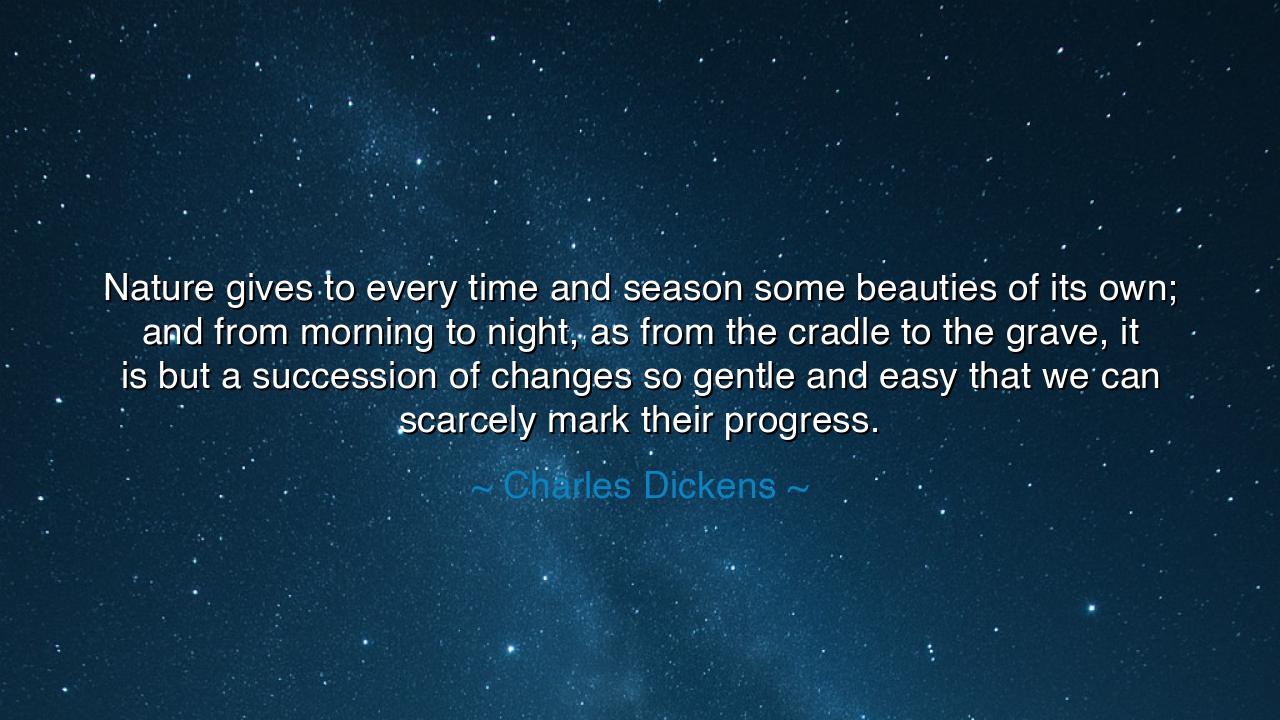
Nature gives to every time and season some beauties of its own;
Nature gives to every time and season some beauties of its own; and from morning to night, as from the cradle to the grave, it is but a succession of changes so gentle and easy that we can scarcely mark their progress.






In the words of Charles Dickens, “Nature gives to every time and season some beauties of its own; and from morning to night, as from the cradle to the grave, it is but a succession of changes so gentle and easy that we can scarcely mark their progress.” In this reflection, Dickens speaks not only as a writer of human hearts but as a sage of life’s rhythms. He reminds us that every age, every moment, every turning of the year holds its own radiance, its own lesson, its own quiet grace. Life, like the unfolding of the day, is not a single blaze of triumph but a steady progression, almost invisible in its softness, yet mighty in its constancy.
The heart of this quote lies in the recognition of beauty within change. The young often cherish the dawn and lament its passing; the strong love the noon and fear the coming twilight. Yet Dickens teaches that every season has its gift. The child’s wonder, the vigor of youth, the wisdom of age—each is adorned by nature with a beauty unique, and to despise one in favor of another is to miss the fullness of life. Just as the spring cannot be the autumn, yet both nourish the earth, so the soul cannot remain forever young, but finds in each stage its own measure of grace.
This truth was known to the ancients. Marcus Aurelius, in his Meditations, spoke of accepting each moment as woven into the fabric of the universe. He compared life to a flowing river: one cannot halt its current, but one can learn to see its sparkle at every bend. Dickens echoes this same wisdom, urging us to recognize that the river of life is not rushed by violence but carried gently forward, so gently that we scarcely feel the passage—until, in looking back, we realize how far we have come.
Consider the life of George Washington, who, in youth, was a fiery soldier, in manhood a steadfast general, and in old age a weary but wise statesman. Each season of his life bore different burdens, yet also different beauties. His vigor won battles, his endurance built a nation, and his restraint in stepping down from power gave birth to democracy. From morning to night, his life was not one fixed moment of glory, but a succession of changes, each carrying its own quiet majesty.
Dickens’ words also speak to the human tendency to resist the succession of changes. We mourn the end of youth, we fear the coming of age, we dread the silence of old age. Yet the natural world rebukes such fear. The flower does not lament its fading, for it leaves seed; the sun does not resist its setting, for it promises a dawn. Change, Dickens reminds us, is not to be feared, but embraced, for it is the very rhythm of existence.
The emotional strength of the passage lies in its gentleness. Dickens does not thunder of death and destiny, but whispers of the softness of life’s unfolding, so subtle that “we can scarcely mark their progress.” He teaches us to be attentive, to notice the small miracles—the morning light on a leaf, the laughter of children, the quiet strength of elders. For if we rush too fast, we miss the beauty of the very changes that shape us.
So, O listener, take this teaching into your heart: cherish the beauty of each season of life. Do not cling to one stage nor flee from another, but see in every moment the unique gift that nature has wrapped within it. Learn to live with eyes open, not only to the blaze of noon but also to the softness of twilight. For life is not a single moment of splendor, but a tapestry of many threads, woven together so gently that only wisdom can perceive its pattern.
And therefore, let your daily practice be this: in the morning, give thanks for energy; in the afternoon, labor with strength; in the evening, rest with gratitude. And in every stage of your years, look not to what has passed or what is yet to come, but to the beauty of the season in which you stand. For in doing so, you will walk in harmony with nature’s succession of changes, and your life, from cradle to grave, will shine with a beauty that endures.






AAdministratorAdministrator
Welcome, honored guests. Please leave a comment, we will respond soon